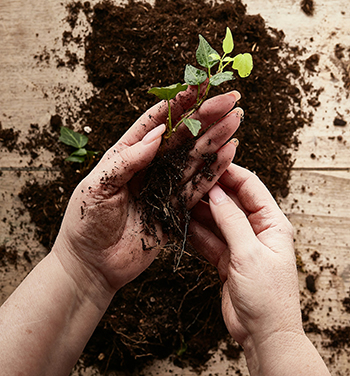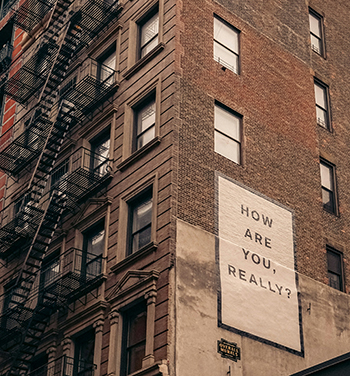Body Liberation for Mental Health
February 19, 2025 • By Katie Borofka, MPH, LCSW, CST

Katie is a Licensed Clinical Social Worker, a Certified Sex Therapist, and a Certified Body Trust® Provider. You can reach her here.
I remember when I started therapy as a 23-year-old: it was to target a lifelong issue of pesky “body image issues,” issues that I’d felt plagued by since at least the third grade. My first therapist had me buy a workbook on self-esteem and work with my “cognitive distortions” about my body. In a way, calling the constant barrage of fearful thoughts “cognitive distortions” was accurate because I was living in a thin body and had since puberty. The pervasive voices of fear and despair and cycling preoccupation only strengthened through all of the disordered eating since puberty and the compulsive exercise I topped it off with starting in college. Working on “cognitive distortions” made sense for me as long as I could see that my body was thin and not fat… working with “cognitive distortions,” however, wouldn’t do anything for the underlying beliefs that I held at the time: that being fat was bad on a number of levels and that I needed to do everything in my power to stay small. I didn’t stay with this therapist for very long and the work was marginally helpful.
 I had a wonderful therapist for a time after that and we would talk about the impact that my childhood had on my body image–everything from the food rules and dieting in my house to teen magazines to my experience in puberty to my dating relationships in high school. Interrogating some of the interpersonal and societal issues in this safe space felt supportive and positive, but after a couple of years, I could feel a dead-end in our conversations. I didn’t want to just keep talking about my mom and my friends and bad media and the impact they had on my self-perception.
I had a wonderful therapist for a time after that and we would talk about the impact that my childhood had on my body image–everything from the food rules and dieting in my house to teen magazines to my experience in puberty to my dating relationships in high school. Interrogating some of the interpersonal and societal issues in this safe space felt supportive and positive, but after a couple of years, I could feel a dead-end in our conversations. I didn’t want to just keep talking about my mom and my friends and bad media and the impact they had on my self-perception.
I started having my first panic attacks a year or so later. Moving from movement-based work to desk-based work started impacting my perception of my body (in addition to many other factors) and I wasn’t able to focus on my work responsibilities; instead I would perseverate on how my body looked, sitting at my desk. I found a new therapist who, again, worked with me from a cognitive lens, hoping to help me shift my problematic thinking patterns, and collaborated with a new nurse practitioner to prescribe me anxiety medication. My “body image issues” were simply a form of “anxiety” that I needed help calming down.
I loved this therapist, and she took me seriously, but it only got me so far.
 Finally, several years later, I found a new therapist who was steeped enough in body liberation philosophies that I started having conversations in therapy that took me beyond the frame of “cognitive distortions.” The soil that these so-called “cognitive distortions” grow in is chock-full of anti-fat bias, classism, and racism. I could pull out the weeds all day (“I’m not fat, I’m not fat, I’m not fat. Right? I’m not fat.”) but without turning out the soil and refreshing it with something new, it would just keep fueling the same kinds of thoughts. With this therapist, we would explore how, as long as a part of me feared being fat, it wouldn’t matter how much I reckoned with what my body actually looked like. I could tell myself I was thin all day and remind myself of what I “actually” looked like, but if a part of me still feared being fat because of what our dominant culture says about what it means to be fat, the pervasive and preoccupying worries and concerns would rule.
Finally, several years later, I found a new therapist who was steeped enough in body liberation philosophies that I started having conversations in therapy that took me beyond the frame of “cognitive distortions.” The soil that these so-called “cognitive distortions” grow in is chock-full of anti-fat bias, classism, and racism. I could pull out the weeds all day (“I’m not fat, I’m not fat, I’m not fat. Right? I’m not fat.”) but without turning out the soil and refreshing it with something new, it would just keep fueling the same kinds of thoughts. With this therapist, we would explore how, as long as a part of me feared being fat, it wouldn’t matter how much I reckoned with what my body actually looked like. I could tell myself I was thin all day and remind myself of what I “actually” looked like, but if a part of me still feared being fat because of what our dominant culture says about what it means to be fat, the pervasive and preoccupying worries and concerns would rule.
My professional and personal work with body liberation and anti-fat bias have paralleled each other: as I have become more self-aware, more compassionate, and more self-trusting with my eating, movement, and body, I have been able to reckon with the true roots of body hatred and extend these kinds of perspectives and reframes to clients.
Body liberation work in therapy is far more complicated than identifying “thought errors.” In this culture, it is not an error to think that my body is a problem based on its weight, shape, or size: that is system design. Even in a body that more closely adheres to the cultural ideal, a person internalizes these “thought errors” to be reminded that they can lose access to privilege, and thus to safety. Those “thought errors” are hyper-attuned protective parts of us, just trying to keep us safe.
 Instead, body liberation work is about slowing down. It is about beginning to reckon with so many problematic ideas that our culture has fed us. No, we cannot get a “new” us in January just by cutting out certain foods. No, a new life is not waiting for us if we can only lose those last X number of pounds. No, weight does not dictate health. And no, not everyone pursues “health” in the same kind of way. Body liberation work is about grieving so many lies, and so many lost dreams, time, money, and energy. I had a slow and steady deconstruction of “health ideas” that lasted about a decade (and I’m sure more will occur). The grieving has been happening for a long time and I expect it to last my lifetime.
Instead, body liberation work is about slowing down. It is about beginning to reckon with so many problematic ideas that our culture has fed us. No, we cannot get a “new” us in January just by cutting out certain foods. No, a new life is not waiting for us if we can only lose those last X number of pounds. No, weight does not dictate health. And no, not everyone pursues “health” in the same kind of way. Body liberation work is about grieving so many lies, and so many lost dreams, time, money, and energy. I had a slow and steady deconstruction of “health ideas” that lasted about a decade (and I’m sure more will occur). The grieving has been happening for a long time and I expect it to last my lifetime.
Body liberation work is about seeing these lies rooted in what they actually are: racism, classism, and patriarchy. It is seeing how the body hierarchy depends on an interconnected system of oppression, meant to keep white cisgender straight wealthy able-bodied men at the top and the rest of us down in stratified layers.
It is about finding slow and steady ways of disrupting our patterns of relating to ourselves and others. It is about putting into practice new behaviors that actually uphold our humanity and dignity. Deciding to throw away a scale after years of daily weighing. Allowing oneself to eat a cupcake at a friend’s party. Allowing for rest in the face of years of daily compulsive exercise. Setting boundaries in conversation with coworkers when they are yet again gossipping about so-and-so’s body. Saying to a parent “I am not talking about my body or my health with you.” It is about finding movement that actually feels enjoyable. It is about investigating our connection to gender roles and expression. It is about reclaiming our voice, our agency, our desires and finding ways to take up space. It is about allowing for a slow rebuilding of trust with ourselves around eating. It is about rooting up perfectionism and urgency in our daily lives and in the ways we connect with ourselves. There is not a way to get any of this perfect or to get through it or over it fast. The process is messy, painful, and complicated.
 There is not a magic pill that will instantly cure the decades and decades of conditioning we receive around what it means to have a body. There is not one book, one diet, one way of living that has the ultimate truth or answer. There are therapists, like myself, who can offer one-on-one space to do this work; that can be a beautiful thing. And it is not enough. We need fellow rebels and activists and we need to find each other. We need community who says, Your body is not the problem. You are surviving the best way you know how. You are not alone.
There is not a magic pill that will instantly cure the decades and decades of conditioning we receive around what it means to have a body. There is not one book, one diet, one way of living that has the ultimate truth or answer. There are therapists, like myself, who can offer one-on-one space to do this work; that can be a beautiful thing. And it is not enough. We need fellow rebels and activists and we need to find each other. We need community who says, Your body is not the problem. You are surviving the best way you know how. You are not alone.
ALLY ACTION
Be an ally to yourself and build community. Here are some places to start. Seek out something that feels right for you.
- Center for Body Trust
- Their book, “Reclaiming Body Trust” is a great place to start.
- Check out their offerings for individuals
- Body Trust Professionals Directory
- Association for Size Diversity and Health
- Find at least one person in your life you can have hard conversations with, who you can trust to really listen, who will grieve with you, and who will celebrate your existence as it is right now.
- Practice self-compassion and find weight-neutral ways of caring for yourself.
CURIOUS TO LEARN MORE?
- “Reclaiming Body Trust: Break Free From a Culture of Body Perfection, Disordered Eating and Other Traumas” by Hilary Kinavey, MS, LPC and Dana Sturtevant, MS, RD (2022)
- What We Don’t Talk About When We Talk About Fat by Aubrey Gordon (2020)
- The Body Is Not An Apology: The Power of Radical Self-Love by Sonya Renee Taylor (2nd edition, 2021)